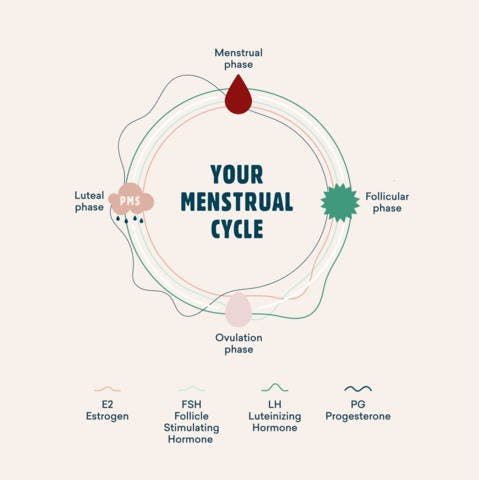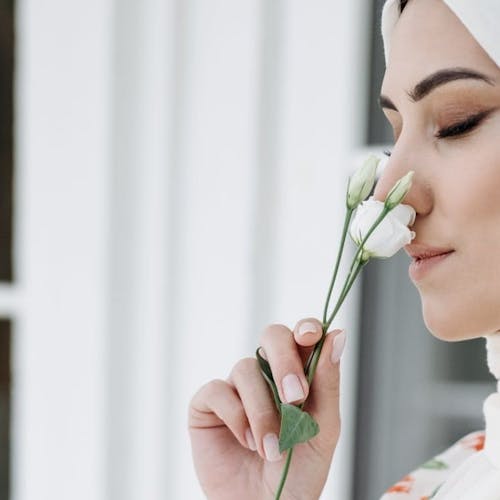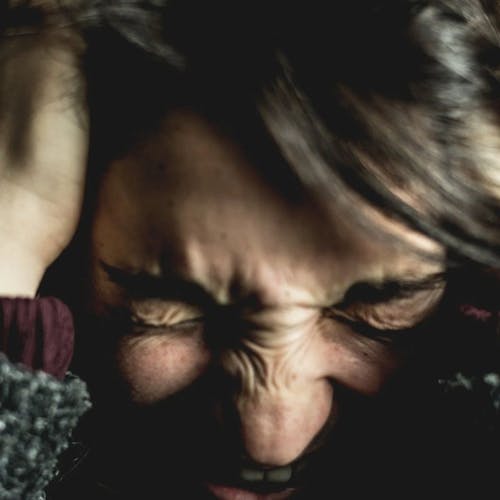This website uses cookies to enhance the user experience. By using Yoppie you are agreeing to our use of cookies.
Understand All The Phases of Your Menstrual Cycle
Written by Yoppie
13 Mar 2022
Hormonal intelligence
Your cycle in a bitesize chunk ✌️
Hormones, what have you done for me lately? 🤔
What is a menstrual cycle pattern? 🩸
What’s the follicular phase? 🤓
What happens during ovulation? 🥚
What happens during the luteal phase? 📈
What happens during my period? 🩸
Hormonal intelligence
Periods tend to hog all the attention when talking about our monthly cycle. They’re a bit like the demanding boss of the menstrual phases. I mean, blood is hard not to notice and you sure can’t miss cramps (gawd, cramps!), but what about the rest of our cycle? Heck, what’s going down in our bodies between the bleeding every month?
Understanding this and how hormones play a part can be empowering. In this article we’re gonna talk about our cycle patterns and the hormones that rule them. Helping you harness that knowledge to your advantage!
To give you a taster of what we’re going to cover in more detail, check out our bitesize chunk below. If you like what you read, keep going as you ain’t seen nothin’ yet.
Your cycle in a bitesize chunk ✌️
The low down on your cycle squeezed into some handy bullet points:
- Follicular phase (Known in some circles as spring!)
Your body is workin’ hard to push you out of your period slump and get schmoozing again. Embrace burgeoning energy and enjoy that oestrogen boost!
- Ovulation (Think of it as the summer of your cycle!)
All three sex hormones are pumping and you’re a force to be reckoned with. You’re a social butterfly, a powerhouse at work and in the bedroom. You are primed and ready to catch any swimmers that come your way during this fertile window! Enjoy it.
- Luteal phase (Heading back into autumn)
Right now you’re winding down from summer with progesterone. Don’t feel guilty taking extra time for self-care, relaxing alone and catching up on the jobs you were too busy for in summer.
- Period (winter is coming)
Your hormones finally dip and the blood arrives. If you have difficult periods, take time to rest and eat well. Keep exercise routines chilled and let your body renew and restore.
Wanna take a closer look? Ok, let’s go.
Hormones, what have you done for me lately? 🤔
We may bash our hormones in exasperated tones, “Ughh hormones!” when we’re complaining about our mood, the state of our skin and more. But they don’t deserve the bad rep.
These brilliant chemical messengers are secreted by our glands. Travelling through our bodies via our bloodstream to organs and tissues, they give essential instructions on processes that need to be carried out to regulate our health and behaviour. Obviously hormones aren’t the only factor determining how we feel, but they certainly play into what’s going on in our everyday lives.
Here, we’ll be concentrating on the hormones that rule our reproductive cycle; The big 3
- Estrogen
- Progesterone
- Testosterone
What is a menstrual cycle pattern? 🩸
A menstrual cycle pattern usually lasts around 28 days but this can vary, depending on the person. Your cycle may even rarely be the same length, fluctuating each month.
Menstrual cycle patterns revolve around these two main events:
- Menstruation (a period)
- Ovulation (when your body grows and releases an egg)
These events are both part of four phases including:
- Follicular phase - oestrogen rules the roost to help your eggs get ready for ovulation.
- Ovulation - your body releases an egg.
- Luteal phase - progesterone comin’ in hot leading up to menstruation.
- Period - when you bleed as your cycle ends and begins again!
Rather than a list, try and imagine the phases flowing in a circle...

Hormonal fluctuations in our bodies during each of these phases trigger physical and emotional changes. They can affect how your skin looks, how you cope with stress, how horny you’re feeling and what kind of discharge appears in your underwear.
Likewise, your cycle can be affected by life events, your overall health, those ten G&T’s you consumed over the weekend, weight gain, your yoga class, all that great sex… you name it!
That’s why working with our hormones (when possible) can give us a powerful advantage. Tracking these changes in your own body as you move through your cycle can give you a really interesting insight into how and why our body does what it does!(1)
What’s the follicular phase? 🤓
A few days after the first day of your period, FSH (follicle-stimulating hormone) and LH (luteinising hormone) are released. These hormones prompt your ovaries to produce from 15-20 eggs, each housed in their own follicle. (2) Right now, they’re growing and competing on the lead up to ovulation as - usually - only one egg will be released! It’s a bit like America’s top model for eggs… only the best make it down the fallopian tube catwalk.
As one follicle begins to dominate and outgrow the rest it starts pumping out oestrogen, reducing FSH. It also helps your uterine lining develop, ready for the possibility of a fertilised egg. You could also notice an increase in cervical fluid and vaginal lubrication as your body moves towards ovulation in the second week.
Mood - Get this party started! 🎉
As oestrogen levels begin to rise, this can have the effect of and making you feel more energetic, motivated and sociable.
In purely biological terms, you’re being encouraged to get out there and find a suitable match to fertilise your eggs. Obviously, not everyone wants a cycle to lead to pregnancy and we’re far more than reproductive vessels! But, this doesn’t mean it’s not a great time to get out and about, arrange to catch up with friends and ease out of period hibernation.
What happens during ovulation? 🥚
Oestrogen is increasing blood flow to your vagina and you may notice cervical fluid becomes clear, slippery and stretchy. Some people refer to it as ‘egg-white’ cervical mucus, because if you stretch it between your fingers it looks suspiciously like egg whites! Oestrogen has now reached its peak. Enter LH (luteinising hormone) and testosterone.
Just before ovulation, there’s an LH surge, halting oestrogen production (2). This prompts the lead egg to burst from its follicle and sashay down the fallopian tubes. It’s here that it can be fertilized by any sperm hanging around!
Mood - How you doin? 😏
All three female sex hormones collaborating can make you feel a little bit invincible! You’re feeling sexier, hornier and more confident. You could notice your skin looking clearer than usual, your features more symmetrical, and feeling more adventurous. Time to wear that super-hot outfit! Testosterone can also boost physical performance which is great for anyone hitting the track or gym.
Some people notice a little bit of cramping at this time, like they actually feel their egg shooting out of the ovary! This doesn't usually last longer than about 24-48 hours though.
What happens during the luteal phase? 📈
Progesterone begins to rise and peaks in the middle of this phase (usually around day 21 in a 28-day cycle). At the start, oestrogen is also still high (2).
Whether you’ve conceived or not, oestrogen and progesterone get busy prepping the inner lining of the uterus to receive and nourish a fertilized egg.
Mood - Netflix 📺
Progesterone can sometimes slow you down, making you feel more introverted and inclined to nights in. But it can also help you feel calm, more relaxed and just happy to just enjoy time on your own. This might be a great time to schedule cosy one-on-ones with friends, nourishing home-cooked meals or just chilling at home with popcorn and a great movie.
If you experience PMS, this can mean tender breasts, bloating, tiredness, feeling irritable or low and craving certain foods. Chocolate, anyone?
What happens during my period? 🩸
A period is both the start and the end of a hormonal cycle. Oestrogen and progesterone reduce to their lowest levels of the cycle.
A sharp drop in progesterone levels trigger your uterus lining to shed, resulting in a period. After the lining has shed, your cycle begins again. (Although, when tracking your cycle always start from the first, not the last day of your period.)
Mood - Don’t even go there 🙅♀️
Without the calming effect of progesterone, you may be feeling tearful, tired, emotional, anxious or unsettled. You can also feel that the arrival of your period is a relief! Ending the bloating and the emotional rollercoaster that’s sometimes felt at this stage in the cycle.
Not everyone has an identical cycle, but observing these monthly changes can make you feel more in control and in tune with your body; always a good thing in our book! You've got enough going on at that time of the month (and heck, all through the month) so don't forget that our personalised full cycle menstrual care box can get organic cotton tampons, PMS supplements, and much more, delivered through your letterbox, whatever phase you're in.
Fact checked by Doctor Brooke Vandermolen.
Section jump
Back to top
Subscribe To Our Newsletter
YOPPIE





© 2026 Yoppie is a registered trademark of Phlo Technologies Ltd.
Yoppie's supplements are not a substitute for a varied diet and healthy lifestyle and are not intended to diagnose, treat, or cure any disease. If you are pregnant, breastfeeding, have a medical condition or are under medical supervision, please consult with your doctor before taking any of our products.






